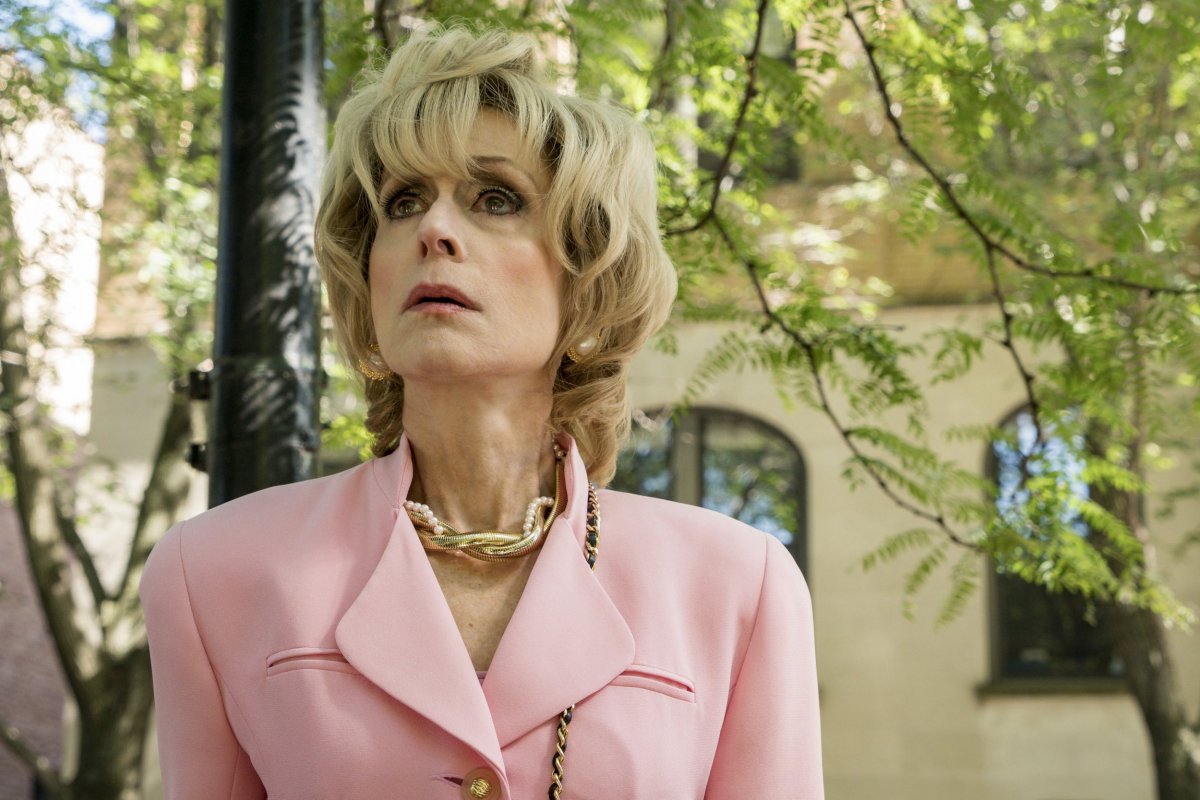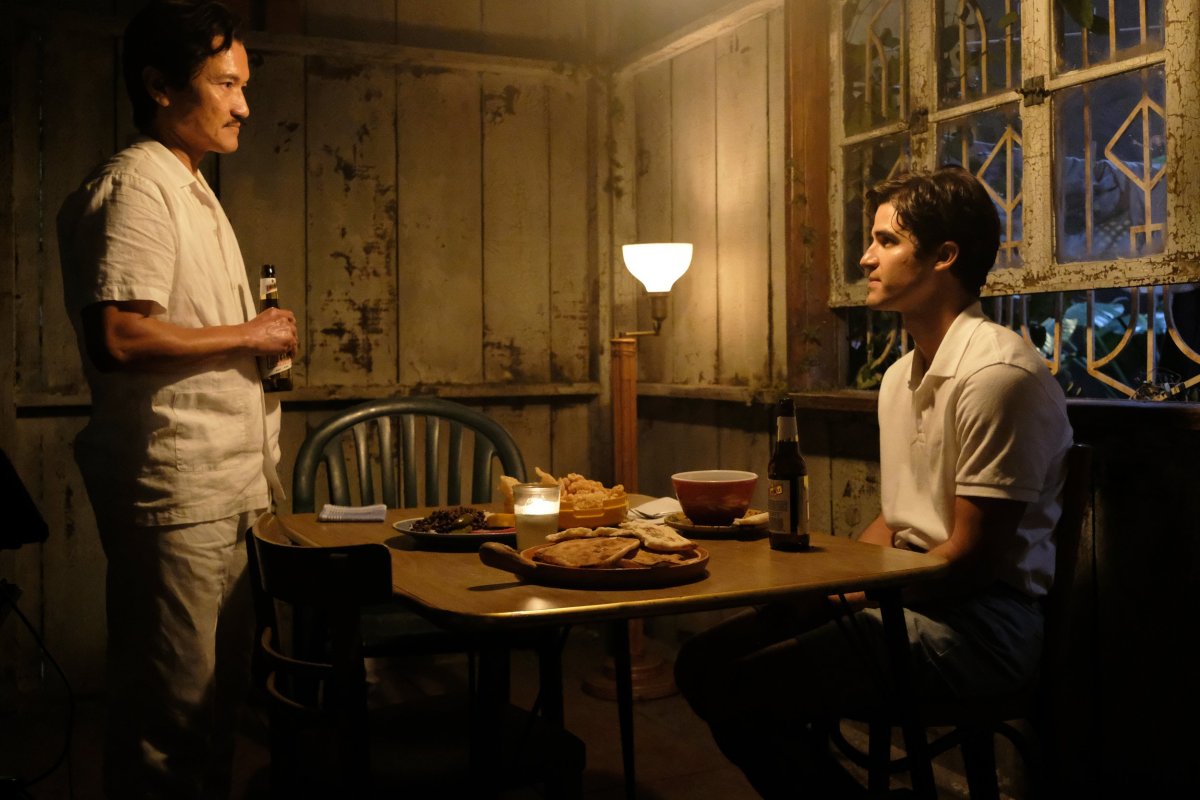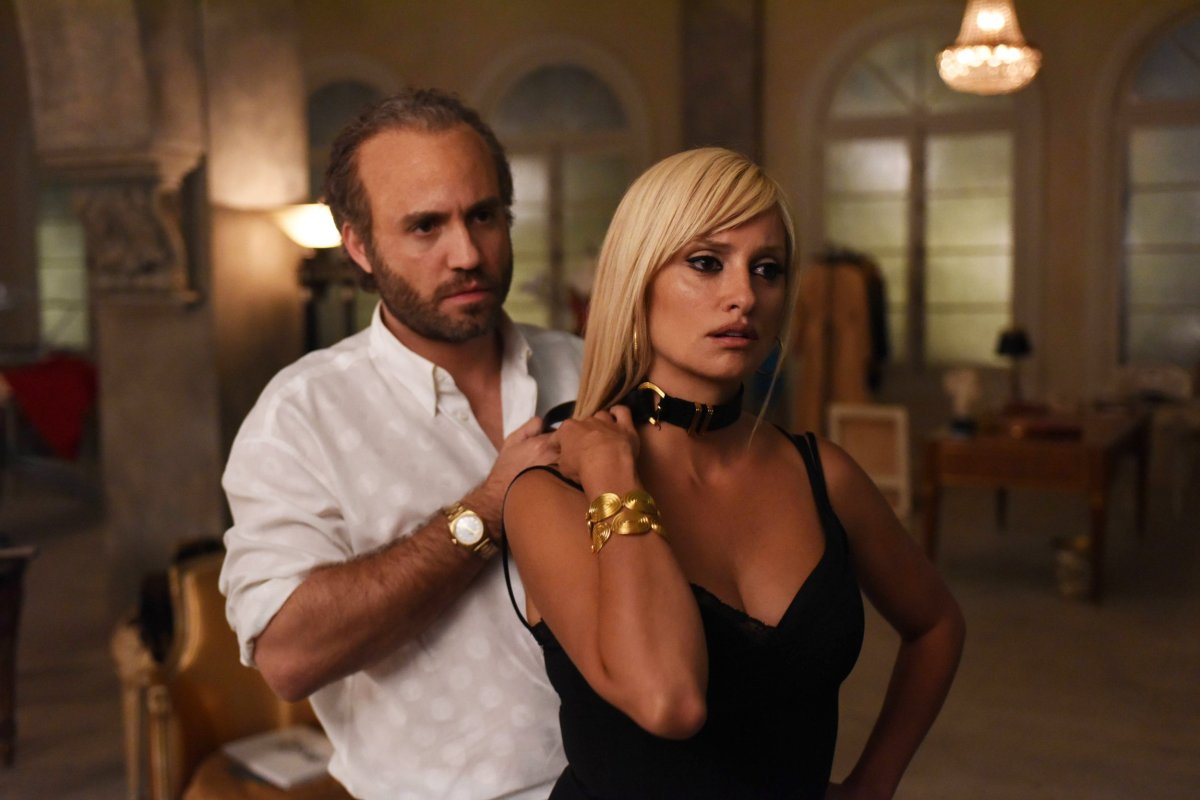Warning: This post contains spoilers for The Assassination of Gianni Versace: American Crime Story finale.
Serial killer Andrew Cunanan met his grizzly end in The Assassination of Gianni Versace: American Crime Story finale Wednesday night, but it was more of a fizzle than a bang for star Darren Criss's final scene.
Eight days after Cunanan murdered famed fashion designer Gianni Versace—and two months after Cunanan murdered his fourth victim— police finally cornered the killer on a Miami houseboat. Rather than face capture, Cunanan puts the gun that killed Versace in his mouth and pulls the trigger.
The episode imagines Cunanan's final days hiding out on that houseboat, while also bringing back many of the series' guest stars: Judith Light as widow Marilyn Miglin, Annaleigh Ashford as Cunanan's childhood friend Elizabeth, Max Greenfield as Cunanan's HIV-positive friend Ronnie, and Jon Jon Briones and Joanna P. Adler as Cunanan's father and mother.
Series writer Tom Rob Smith (who also created the British drama London Spy) adapted this real-life event, and the rest of the series, from journalist Maureen Orth's 1999 book, Vulgar Favors. He spoke to Newsweek about working on the series and what liberties he took in interpreting Cunanan.
What do you hope fans take away from the finale of The Assassination of Gianni Versace?
It works as a retrospective on loss. That's one of the things I'm most proud of about this series. Marilyn Miglin, brilliantly played by Judith Light, says in the finale, "I'm so proud of Lee." There's that sense that all of these victims—not just Versace—were great. A crime story is about a sense of loss, about people being ripped from the world, about that hole they leave behind. That line, and this finale, crystalized that sense of sadness and loss beautifully.

It was almost moving to have Andrew reface so many of these people he hurt before his suicide. But it was hard to tell if he was feeling regret or just fear for his own life.
It's been presented that Andrew is relishing in his notoriety thus far. But for someone who had all his potential, intelligence and impressive education, isn't it also possible that he felt a deep sense of disgust at what he had done? This is not someone who spent his life being horrible to people, he was always trying to charm and impress them—he paid for dinners and tried to win people over. In those final days on that houseboat, there was a sense of great shame, I think. That's our interpretation.
When you say that, is that what you imagine the actual, real Cunanan felt at that moment? Or do you see the show's Cunanan as just a character, inspired but separate from the real killler?
In the end, I think you have to accept that it's an interpretation. But you're drawing on what there is. People have said, "Oh no, he committed suicide because he was trying to outwit the police." I'm like, "He shot himself in his boxer shorts on a bed." I don't know how anyone would think that was a grand ending. The houseboat was in a state of horrendous decay—that space was a manifestation of what his life had become. He did die the day after Versace's funeral, so he almost certainly watched Versace's funeral on TV. I think he would have looked at that and seen a man who is adored, who has the most extraordinary funerals in Milan, while Andrew is in this hellish, sweaty physical decay, despised by the world.
Lots of killers go to trial—they quite enjoy it, in their own way, they enjoy putting the victim's families through the trial, as part of their sickness. Very few of them commit suicide. So I think, whatever Andrew might have told himself, there must have been some deep sense of shame that he didn't want to face in a courtroom. He didn't want to have his crimes read out to him.
What details did you add to his final hours for the show, to help support that interpretation of Andrew?
Obviously, we don't know what he watched. We just know what was on and we know that there was a TV [in the houseboat]. We do know that the Versace magazines were there, and we know that there was nothing left to eat in that houseboat. We know that he had absolutely no money. He had no way of getting any food and he was trapped. There's that sense of the world bearing down on him. His dad claimed that he called him.
Really?
Yes, his dad claimed to Maureen Orth in Vulgar Favors that he called him—the exact claim is that Andrew called him to talk about the film rights. Of course, his dad could be lying. We certainly don't know that Andrew asked his dad to come get him. But I didn't make up the name of the movie title, A Name to Remembered By. The dad really did say that. But [Andrew] shooting the TV set isn't true. We put that in because we wanted to get across that the sixth person that Andrew would have gone for next [to kill] would have been his dad.

Modesto Cunanan is a fascinating character, both in the show and real life. Did you guys ever find out what happened to the real person?
We don't know, and actually we really tried to find that out. We don't think he's in America; we think he might not be alive anymore. It's very hard to find someone. But I know that Fox did do research on that and didn't come back with anything.
What we know about the real man is that that he gave Andrew the master bedroom, and that he then came in to use the closet. So he set up an excuse to go into there. To my mind, that was immediately a red flag. We also know from Maureen's research that Andrew's lie in Episode 1—"Oh my dad used to drive around with a chauffeur, and he was having an affair with the chauffeur"—that's a real lie from Andrew. I always think that lies are very revealing. I remember first reading that and thinking, "That's a strange lie." That's one of those interesting things about going backwards— you get that lie in Episode 1, and you think it's just Andrew being crazy. When you get to Episode 8, you're like, "Wait a minute. What was behind that lie?"
The show makes very explicit—especially in the finale—that one of the reasons the FBI took so long to catch Cunanan was a lack of connections in the gay community and a disregard for gay lives. That felt like a statement on the homophobia of the authorities in the '90s.
There's a couple of things I'd say. This is not a story where it's about the homophobic cop that doesn't catch anyone. I think the most homophobic person in this story is Andrew Cunanan himself. He is just this horrific homophobic bully to Lee Miglin. He's using everything he understands about shame and disgrace against his victims. And with David, he's trying to trap him into to staying with him by saying, "The police will never believe you, they hate you."
Many things he says have truth in them, and in Miami it was a fiasco. I don't know why they didn't put the flyers up, I don't what was going on there. Other cities they were better—I think they were better in New York and San Francisco, and I think the various gay communities there were better connected to the police. But catching people is tricky, and people make mistakes without have a racist, sexist or homophobic agenda behind it. People just screw up.
But when an officer refuses to go into a gay club to put a flyer up, that is a real issue. And when Andrew was just walking around Miami—the diner where he ate was just directly opposite the police station. I do think you can say that Versace should not have died.
Given the title of the series, I think some fans were surprised that the show ended up being more Andrew Cunanan's story than Versace's.
I was sent Maureen's book two years ago, and I was always adapting this book. The Versace story is not a crime story—his life story is a success story. And in Maureen's book, [Versace's] only really in the story at the end. One of the things we talked about is that we really want to bring him to the fore, because he's such an interesting counterpoint to Andrew. I don't think you can just say Andrew was a product of society. Andrew was his own creation. He was beaten by things other people overcame. Andrew was lazy, vain and entitled. Yes, he did encounter enormous prejudice, but so did Versace, and Versace overcame those things. So when you look at it that way, it became a very interesting counterpoint. That was the genesis of the story. But I can understand why people thought it was going to be a biopic.

The real Versace family publicly condemned the show and the book as "a work of fiction." Have you heard anything else from them since it's been airing?
No, only the initial statement, which is the same statement they brought out at the publication of the book. One of the advantages of not doing a Versace-intensive biopic is that you can concentrate on what was amazing about that family. You don't really need to get into the other gossipy stuff about relationships or drugs. None of that is relevant to this story. It's just about saying what was amazing about Donatella and her relationship with Gianni because that's what we're counterpointing against Andrew.
In the end, it's just a story about two families. You're comparing them. That's what I really love about Episode 8. I don't know anything about how [the real Versace family] feels, but the show is really a celebration of Gianni Versace as an artist.
Uncommon Knowledge
Newsweek is committed to challenging conventional wisdom and finding connections in the search for common ground.
Newsweek is committed to challenging conventional wisdom and finding connections in the search for common ground.
About the writer
Anna is a Newsweek culture writer based in New York City. Previously she was a Film/TV writer at Elite Daily and an ... Read more
To read how Newsweek uses AI as a newsroom tool, Click here.








